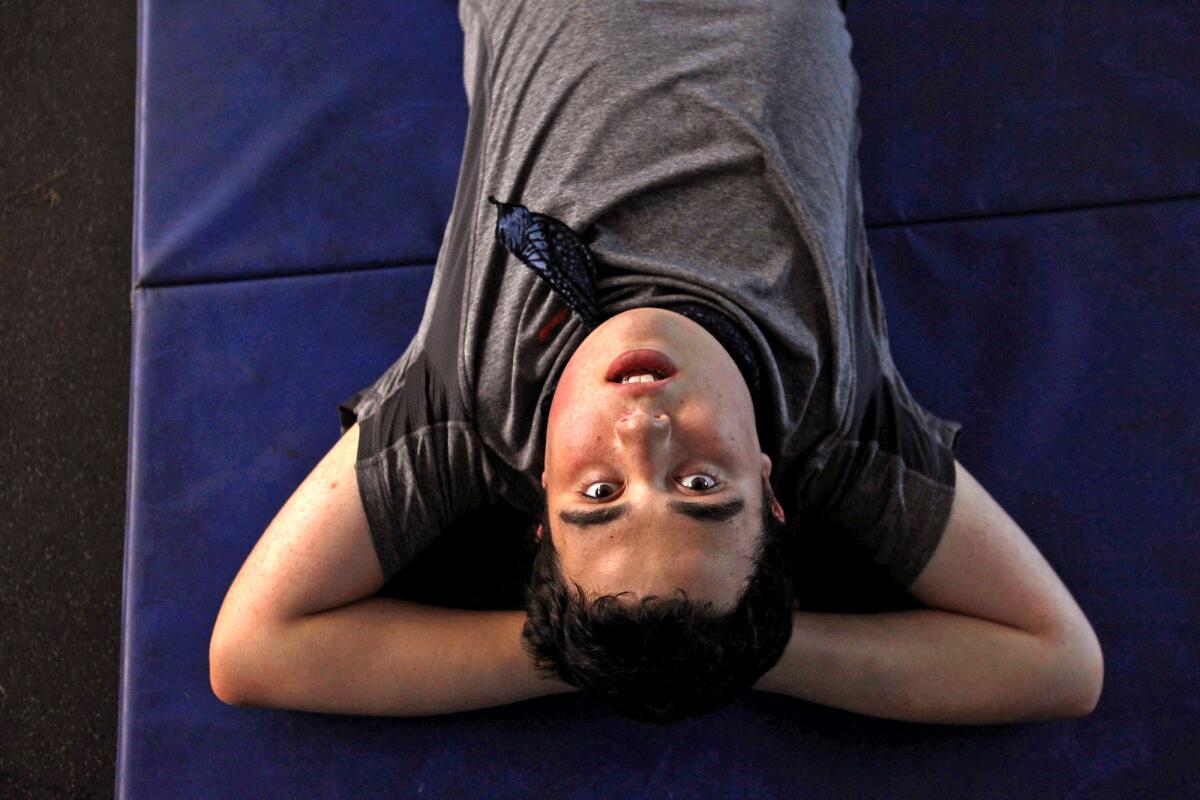In the ‘silent prison’ of autism, Ido Kedar speaks out
The high school student’s ‘Ido in Autismland’ is part memoir and part protest, a compelling message to educators on how to teach people such as him.
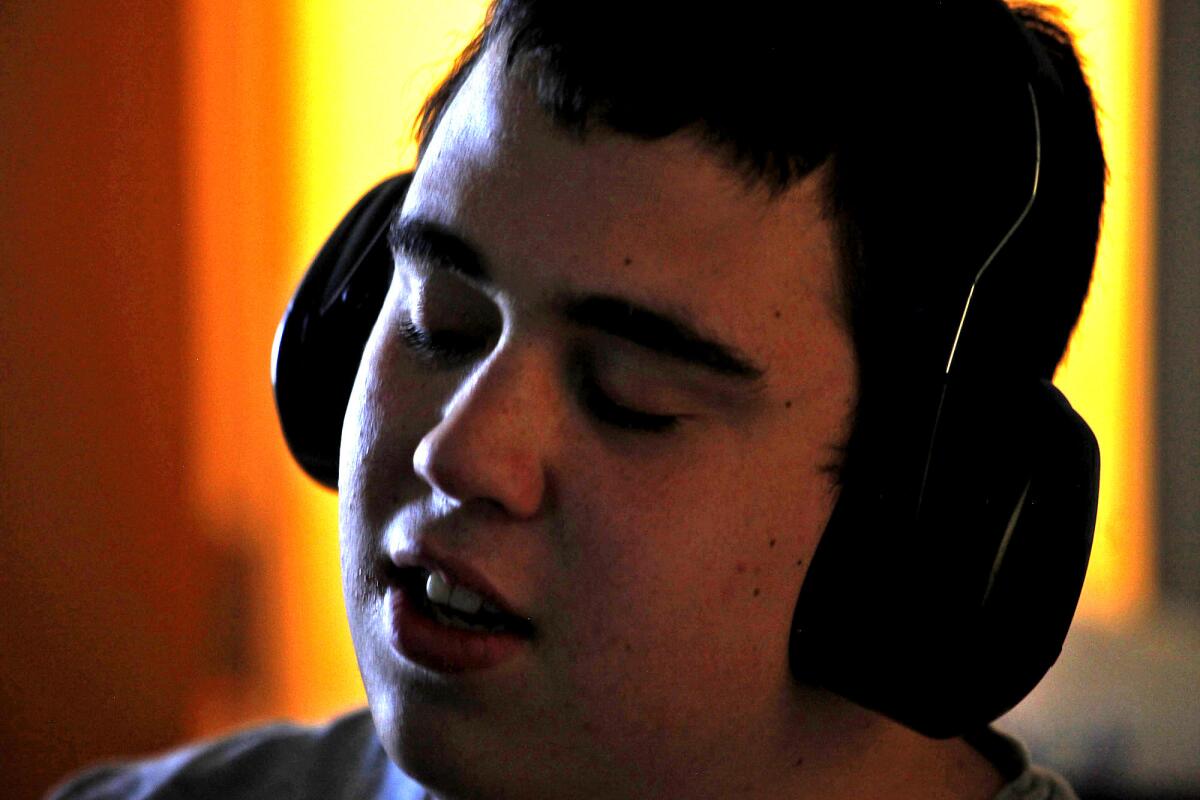
I t-h-i-n-k ...
Ido Kedar sits at the dining room table of his West Hills home. He fidgets in his chair, slouched over an iPad, typing. He hunts down each letter. Seconds pass between the connections.
... A-u-t-i-s-m-l-a-n-d ...
He coined the word, his twist on Alice's Wonderland.
"C'mon," says his mother, Tracy. "Sit up and just finish it, Ido. Let's go."
He touches a few more keys, and then, with a slight robotic twang, the iPad reads the words he cannot speak.
I think Autismland is a surreal place.
For most of his life, Ido has listened to educators and experts explain what's wrong with him. Now he wants to tell them that they had it all wrong.
Last year, at the age of 16, he published "Ido in Autismland." The book — part memoir, part protest — has made him a celebrity in the autism world, a young activist eager to defy popular assumptions about a disorder that is often associated with mental deficiency.
He hopes that the world will one day recognize the intelligence that lies behind the walls of his "silent prison," behind the impulsivity and lack of self-control.
I want people to know that I have an intact mind.
Yet Ido gets nervous easily and likes to retreat to his room or to a cooking program on television. At one point, after answering a few questions, he steps outside to pace beside the family swimming pool.
He plucks a rose and puts its petals into his mouth.


Ido Kedar wears sound-blocking headphones because of his heightened sensitivity to sound. "My dogs bark like shotguns. The gardeners mow with tanks and blow leaves with hurricanes," he wrote. More photos
During summer, when temperatures in the San Fernando Valley push into triple digits, Ido's refrain is "osha, osha," and his father, Sharon, drives him over the mountains to the ocean.
Approaching Zuma Beach on a Sunday afternoon in September, Sharon repeats the rules: "Follow my instructions, and stay behind me at all times."
"Eee, num, num, num," Ido says with a laugh.
"You're happy now that we're going to the beach," Sharon says.
They drop their towels in the sand by Tower 12. Ido waves his arms and grabs Sharon's arm as they march into the waves.
Autism, Ido says, is like being on LSD, something he learned about in health class, and his experience in the world can be at times terrifying and overwhelming. Sensory minutiae that in other people are filtered and organized, collide indiscriminately in his brain. Feelings of anger, sadness, even silliness can escalate, and he can have difficulty calming down.
The water surges around them. The sound of the waves and sea gulls, the voices and screams of children and families, the surf, rising and falling, its ceaseless crescendo and diminuendo, rushes at Ido as a terrible cacophony like the buzzing of mosquitoes, loud and inescapable.
As unsettling and as unpredictable as autism is, it also brings a strange pleasure to Ido's life. Glints of sunshine, pockets of shade mesmerize him, and objects in motion reveal traces of acceleration, like stop-motion photography.
He grabs a strand of kelp, strips off the leaves and begins whipping it over and over in an S-pattern against the dissolving foam. Waves rise and fall against him, but he stays focused on the movement that he's created against the water's surface.
Like many of his repetitive behaviors — arm-flapping, finger-dancing, string-twirling — this gesture, referred to in the autistic community as a "stim" (for self-stimulation), enhances sensations around him and has a narcotic effect.
They take me to a sensory experience that is pretty intoxicating. I don't get lightheaded, but I can get so absorbed in a stim I sort of vanish from my personhood.
A half-hour later, Ido and Sharon are heading home. Ido cues the "Nutcracker Suite" on the CD player. Tchaikovsky is one of his favorite composers. Flutes and oboes, trumpets and tuba, triangle, celesta and glockenspiel begin to weave their complex melody.
Music is a beautiful gift. I see pretty images of moving light. Different composers have different patterns.
Sharon and Ido hold hands as they crawl through traffic.

Ido has a speech to write. In almost two weeks, he will address graduates from the department of special education at Cal State Northridge. The invitation came from a professor who calls "Ido in Autismland" one of the most profound books he's read.
As committed as Ido is to explaining his experience with autism, he is equally passionate about how to teach autistic children. Some of his worst teachers have become his best teachers for what not to do, and he thinks he knows why.
They have to let go of their love of power.
Sitting in the living room, Tracy, Sharon and a friend, Adrienne Johnston, are helping Ido organize his thoughts. He is communicating with his letter board, a laminated piece of cardboard with the alphabet printed on it. His right hand dances among the letters, a blur of quick expression, far quicker than his iPad.
Johnston, who will be speaking at Northridge as well, works for the Los Angeles Unified School District and helps students with disabilities navigate from special education to general education classes. She met Ido in middle school and continues to help him at Canoga Park High School.
"When I first graduated, I thought I knew it all," she says, thinking about new teachers. "We need to remind them that their attitudes must be open."
The special education idea is to maintain and contain.

Ido Kedar spends a quiet moment to himself in the schoolyard during lunchtime at Canoga Park High School. "I'm a strange mixture. I am smart as a mind and dumb as a body. I can think of insights and my body ignores them," he says. More photos
"What should they do, sweetie?" his mother asks.
I think they should all be kept mute one day and sit in a low autism class as a student, listening to baby talk and the weather.
Tracy and her husband laugh. Years of frustration and guilt have turned to pride. She's 53 and works as a school social worker and private therapist, and he's 50, a geophysicist at the Jet Propulsion Laboratory.
They recall one administrator at a former school who insisted that Ido wasn't doing the classroom work, that his aide was answering the questions.
It's a familiar and painful memory. His dependency on others is considered evidence of his inability to think for himself. After one of Ido's presentations, Tracy was approached by an older man who asked if Ido really understood everything said to him.
"Eeeee, eeeee," Ido interrupts.
"He was a bully," Tracy says, remembering the administrator.
He told my teachers that I was not understanding the work. He would stand behind me taking notes on my behavior. He told me that I would never graduate.

As an infant, Ido seemed to hit all his developmental benchmarks. He even began to talk at an early age. But somewhere between 2 and 3, he suddenly felt as if he were standing at a divide in a road. Try as he might to join other children, he couldn't.
Tracy remembers the day she got the phone call from the preschool.
I can get so absorbed in a stim I sort of vanish from my personhood."— Ido Kedar in 'Autismland'
"We have our concerns," the administrator said.
Tracy and Sharon took Ido to a psychiatrist, who made the diagnosis in 20 minutes.
Ido was enrolled in Applied Behavior Analysis, the most popular and recognized treatment for the disorder.
For two years, aides set up school in his home and ran through daily drills to teach motor and social skills, such as how to eat with good manners and wash, how to recognize words and emotions, how to wave goodbye and point. Rewards came in the form of tortilla chips, cookies and tickles.
The lessons frustrated him, and the aides seemed unaware of his discomfort. They wanted, for instance, to teach him to maintain eye contact, but light reflecting off eyes unsettles him, and because he was unable to speak or coordinate his hands to indicate comprehension, the drills were repeated.
"Very stimmy today," wrote one aide in a log dated 2003, when Ido was 6. "Lots of jumping around the room @ the beginning of the session. Last 1/2 hour seemed tired & cranky. High frustration."
As other children progressed with ABA — one even going into kindergarten — Ido fell more deeply into Autismland.
I felt kind of terrified when I was a kid that my life would be this way forever.
Once Ido started school, Tracy worked with him at home. She helped him hold a pen, and with her hand over his, she guided him through his letters.
He always loved letters. As a toddler, he would clap at the credit rolls on television and sit by the pool watching his grandfather paint the alphabet on the pavement. Ido enjoyed watching the patterns evaporate in the sun. Each letter, he says, has a unique personality; his favorite is H.
One day before his seventh birthday, Tracy and Ido were preparing invitations.
"Please come to my party," they wrote, and when she asked him for the name of a friend, she felt him moving the pen. The lines were wobbly; his coordination was poor, but he was writing the letters himself.
After years of silence, Ido and Tracy had found a way to talk to each other.

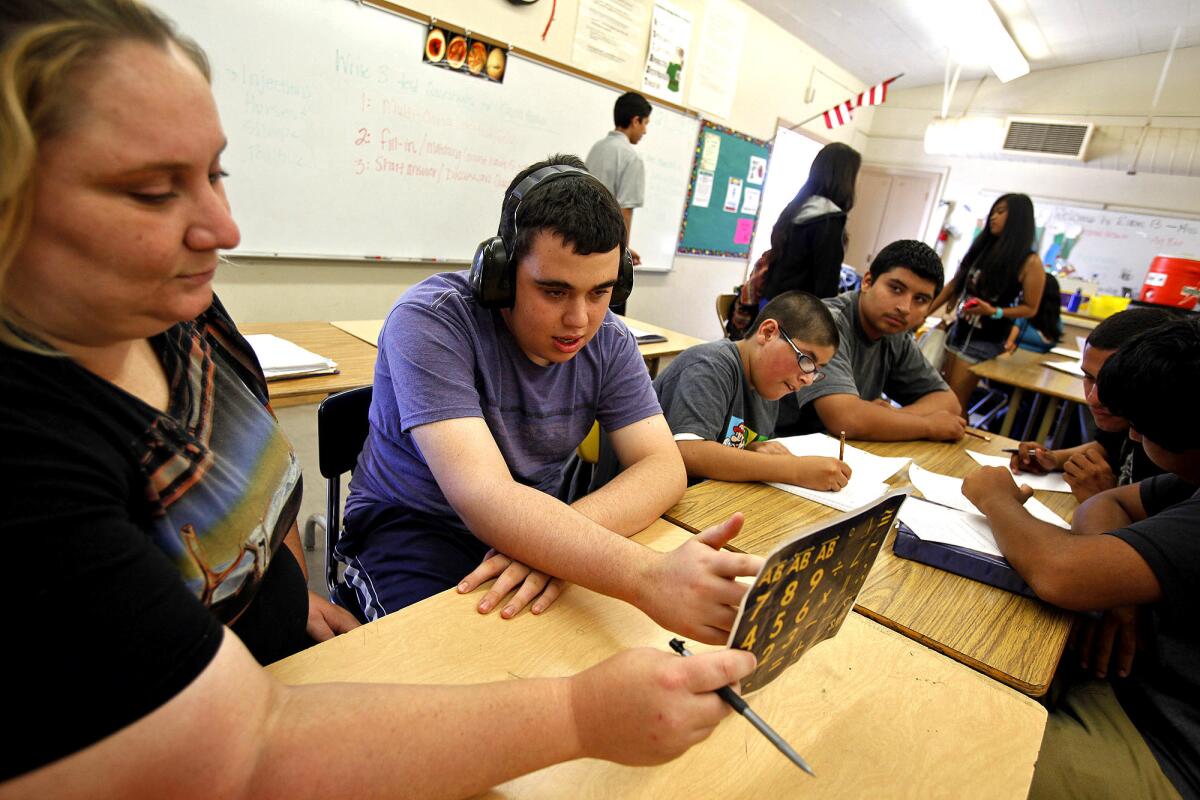
Ido Kedar, second from left, answers a question with the use of a letter board held by aide Anna Page. He prefers the letter board, inscribed with the alphabet, over an iPad. More photos
When Ido was younger, he hid in a closet when visitors dropped by. On the eve of his 17th birthday in May, he is darting from the dining room into the kitchen. Family and friends have begun to arrive.
Tracy lights two candles for Sabbath and says a silent prayer. She turns to her son. "Happy birthday, Ido," she says. "Here's to a wonderful year, and may you continue to be a blessing."
She kisses his forehead. Sharon drinks a little wine from a small silver cup they received when Ido was born.
After dinner, Ido twirls an upside-down plastic cup on his knife, hypnotized by the motion, and asks to be excused. He settles on the sofa to watch "Alice in Wonderland."
Later, over marzipan and white chocolate cake, everyone gathers to sing "Happy Birthday." But at the first words, Ido cups his hands over his ears. Soon they are whispering the song.
Sensitive to sound, he often wears his "bulletproof" headphones, the type that shooters wear at firing ranges.
My dogs bark like shotguns. The gardeners mow with tanks and blow leaves with hurricanes.
Ido says he can also see auras, emanations of color around people that help him gauge their temperaments.
His mother is blue, his sister is green and his father is greenish-yellow. Purple, he says, is the most open-minded color, brown the most closed off.
Brown is the color of my ABA teachers.
He was pulled out of the ABA program when he was 7 and began working with a woman who had been successful teaching her autistic son.
Soma Mukhopadhyay met Ido at her apartment in Hollywood for an hour each Sunday. The lessons were not dependent on drills or rewards.
Soma was different from any other teacher because I knew immediately that she saw I was smart.
During one session, after fighting with Mukhopadhyay, he threw himself on the floor, crying. Tracy apologized.
"It isn't a tantrum," Mukhopadhyay said. "It is sorrow."

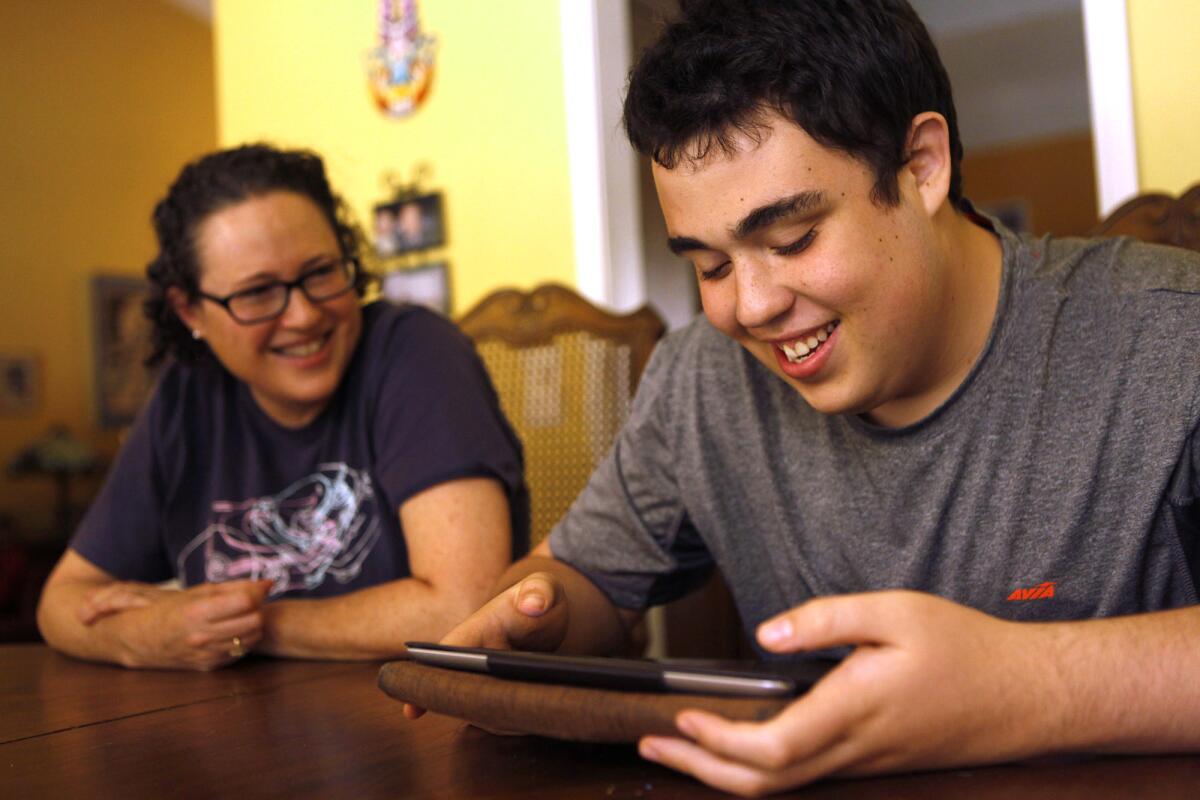
Ido Kedar, with his mother Tracy, writes on his iPad. "I felt kind of terrified when I was a kid that my life would be this way forever," he once wrote. More photos
Ido takes his favorite desk in a corner of Amber Tesh's classroom. Tesh is reading a scene from "To Kill a Mockingbird."
Ido has just come in from lunch, where he stimmed in a secluded corner of the crowded schoolyard out of the way of other students playing handball, making out or texting.
I'm a strange mixture. I am smart as a mind and dumb as a body. I can think of insights and my body ignores them.
This afternoon Tom Robinson is on trial, and Atticus is questioning Mayella in court.
"What do we know about Mayella?" Tesh asks.
"She's dumb," says one of the students.
"Yes, but what else?"
In the silence, Ido leans forward, rocking back and forth, smiling and laughing slightly to himself as if someone has just told him a joke.
He begins to point to the letter board his aide is holding in front of him.
She likes Tom.
"That's right," says Tesh, who is proud of Ido's work. In the California High School Exit Exam, he scored 443 out of 450, missing one answer.
Of all his classes, Ido likes his honors English class most, especially because Tesh treats him like other students.
He knows that his behavior is unusual. He envies his sister, and wishes he had her independence and friends. Unlike some autism advocates who champion the disorder as an emblem of diversity, Ido would prefer to be typical.
Can I visit Autismland instead of living here?

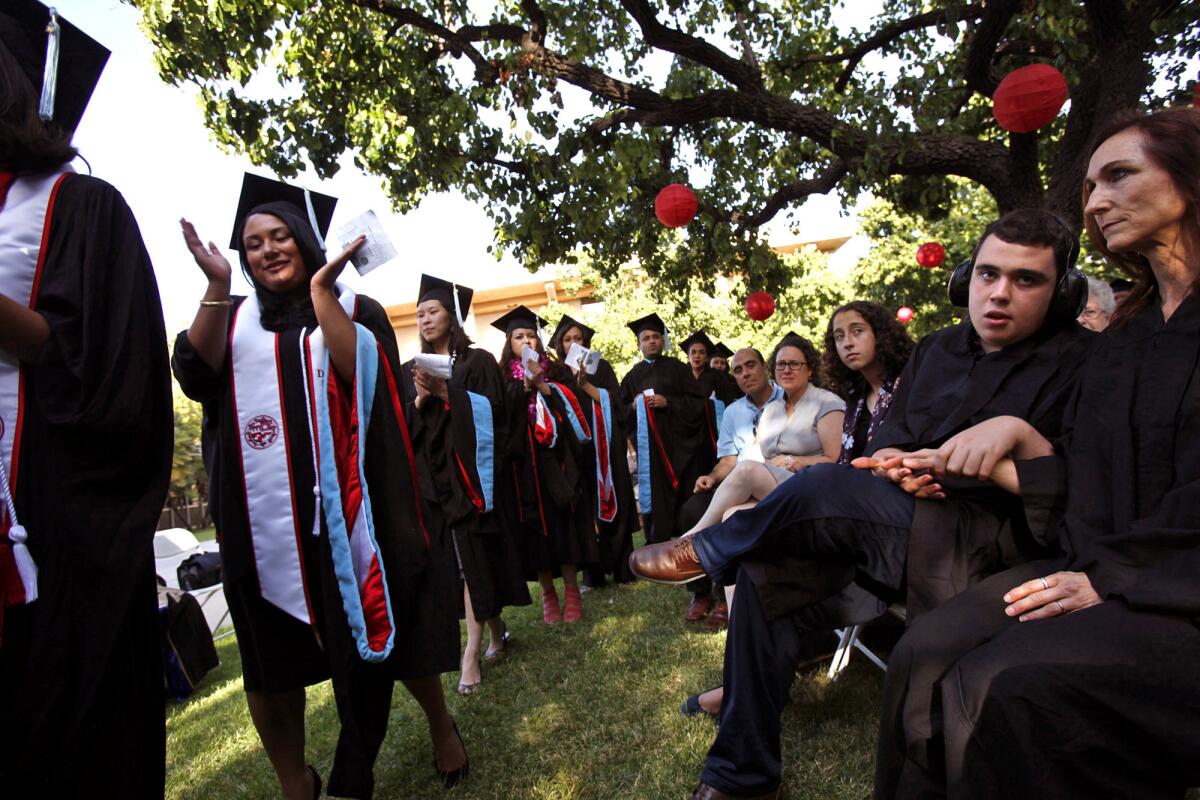
Ido Kedar sits with former teacher and friend Adrienne Johnston, right, along with his family after speaking at Cal State Northridge. More photos
The Cal State Northridge campus is crowded with graduates. Tracy, Sharon, Ido and his sister, Liat, walk toward the open square where the department of special education will gather for its commencement. Pachelbel's Canon plays in the distance; Ido adjusts his headphones.
As a guest speaker, he is given a black gown. Tracy helps him put it on, and they take their seats.
He's grown accustomed to public appearances. He says he only gets embarrassed when people gush over him.
It drives me crazy when people do that. My situation may be new and tragic to them, but it is my life.
Tracy places her hand on Ido's shoulder. She hopes there isn't too much stimulation for him today. After he got home from school, she had him walk for 20 minutes on the treadmill and spend 10 minutes on the rowing machine. She also gave him a small dose of Ativan to ease his anxiety.
Ivor Weiner, a special education professor, introduces Ido. He tells the audience how they met in January at an autism conference.
"Ido's words," he tells the graduates, "stopped me in my tracks. I admit it, for a long time, whenever families had children with significant challenges, my expectations for these individuals would often be mediocre. After all, how could these individuals contribute to society?"
Tracy stands and guides Ido by the hand to the podium. Sharon connects the iPad to the outdoor speakers.
It is hard to be a teacher of kids who don't communicate. The kids don't have writing, or gestures, or speech, or facial expressions, but that doesn't mean they can't think.
As his words are broadcast, Ido turns away from the audience. He curls his arms overhead, stretches and yawns.
Follow Thomas Curwen (@tcurwen) on Twitter
Follow @latgreatreads on Twitter
More great reads
Iraq veterans find the war at home is with red tape

Sign up for Essential California
The most important California stories and recommendations in your inbox every morning.
You may occasionally receive promotional content from the Los Angeles Times.
